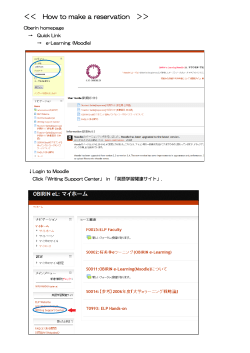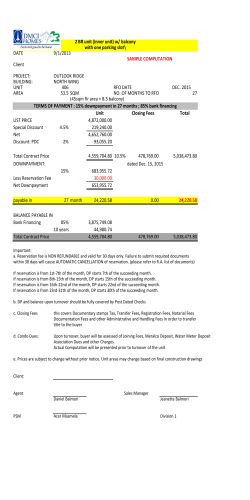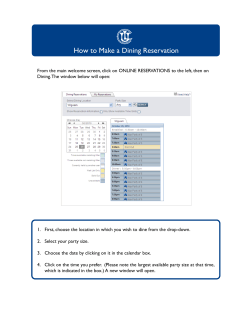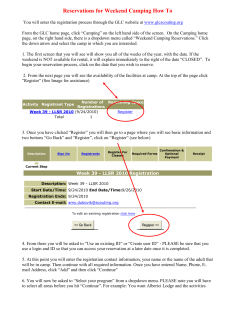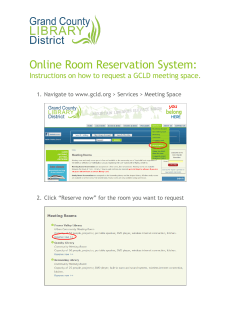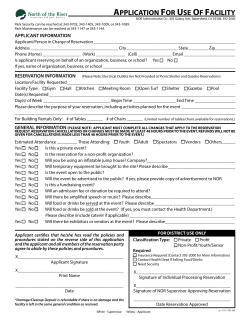
Document 382735
Building an Airliner http://www.flixxy.com/boeing-737-time-lapse.htm Databases Airliner uses well over a million parts Databases: Bill of materials Construction instructions, CAD, CADCAM Customer details Supplier details Test Flight details Maintenance details Spares holdings Logistics http://videos.airbus.com/video/iLyROoafvDZB.html WORLDWIDE AIRLINE TICKETING SYSTEMS Thanks to: Jason Few Natalie Dolphin Jamie Beer Phillip Rainbow Daniel Hunter Ana Hadjimitova Intro Airline Reservations System (ARS) – one of earliest changes to improve efficiency. Eventually became Computer Reservations System (CRS). Used for reservations of airline and interfaces with a Global Distribution System (GDS). GDS assists travel agencies and other distributors in making reservations for the majority of airlines in a single system. HISTORY Looking back at Computer Reservation Systems part 1 1946 – American Airlines successfully installed the first automated booking system. The magnetic Reservisor soon followed which was based on the magnetic drum. This system was then used in several airlines, Sheraton Hotels and Good Year for inventory. There were numerous problems though mainly due to the high level of human operators needed to maintain the system. HISTORY Looking back at Computer Reservation Systems part 2 1953 – American Airlines worked with IBM on improving their Reservisor system. This led to many low level studies being carried out 1959 – Semi- Automatic Business Research Environment was launched (SABRE) this was a computer reservation system. 1964 – SABRE was completed, this made it the largest civil data processing system in the world. It is now used by airlines, railways, hotels and other travel companies SABRE 1960 HISTORY Looking back at Computer Reservation Systems part 3 Other airlines soon followed with their own systems 1968 – Delta Air Lines launched the Delta Automated Travel Account System (DATAS) 1971 – United Airlines and Trans World Airlines followed with the Apollo Reservation System and the Programmed Airline Reservation System IBM was involved in the development of the Programmed Airline Reservation System and later offered its service to Delta Air Lines SCOPE 1976 – United Airlines offered its Apollo system to travel agents. 1976 – Vidcom International with British Airways, British Caledonian and CCL launched Travicom. Travicom was the world’s first mutli-access reservation system. Travicom formed a network providing 49 subscribing international airlines to thousands of travel agents. By 1987 the system was handling 97% of UK airline business trade bookings. SCOPE BA owned 100% of travicom and wished to participate in the development of Galileo systems. Travicom then became known as Galileo UK. 1987 – A consortium led by Air France and West Germany’s Lufthansa developed Amadeus 1992 – Amadeus was launched, a global distribution system which sold tickets from multiple airlines. Amadeus Centre GDS (Global Distribution System) February 2009 – Only 3 major GDS providers: • • • Amadeus Travelport Sabre One major Regional GDS – Abacus, serving in Asia. Other regionals include: • • • • Travelsky (China) Infini (Japan) Axxess (Japan) Topas (South Korea) Inventory Management Airline Reservation Systems contain: • Airline schedules • Fare tariffs • Passenger reservations • Ticket records Inventory contains all flights with seats available. Divided into service classes (First, Business & Economy). . Availability Display and Reservation (PNR) User accesses inventory through an availability display Contains all offered flights for selected city-pair with available seats. Reservations are handled by the Passenger Name Record (PNR). PNR contains personal information of passengers – name, contact info & special requests. Availability Display and Reservation (PNR) Before departure, the Passenger Name List is transferred to the Departure Control System to checkin passengers and baggage. Other data collected is also sent to Flight Operations Systems, Crew Management and Catering Systems. On departure, the reservation system updates with a list of checked-in passengers, and financial data for revenue accounting is handed to the administrative systems. Fare Quote and Ticketing Fares data contains: Fare tariffs Rule sets Routing maps Class of service tables Tax information Two systems used for the interchange of fares data ATPCO (Airline Tariff Publishing Company) SITA (Societe Internationale des Telecommunications Aeronautiques ) ATPCO and SITA Distribute fare tariffs and rule sets to all GDSs and other subscribers for over 500 airlines. Only ATPCO competitor is SITA who distribute some fares in Asia, Africa & Europe. Primary users of the data are GDSs (Sabre, Amadeus etc) Updates are sent hourly and airlines will compare the data to offer the customer a more appealing offer.
© Copyright 2026



